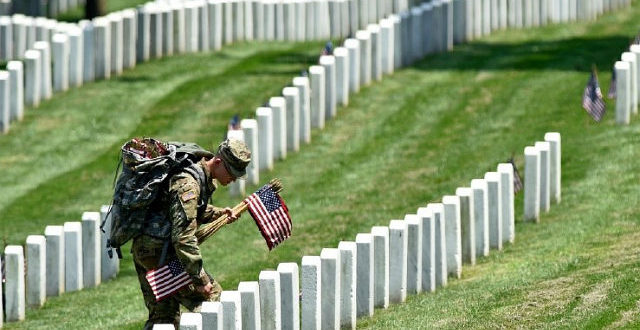Remembering the values our soldiers died for on Memorial Day
Published on May 26th, 2017
By Joe Guzzardi
May 26, 2017
Harrison Daily Times
During my lifetime, the United States has been involved in 18 foreign wars, excursions and interventions. Beginning with World War II, and continuing in a nearly unbroken streak that leads up to today’s Afghanistan Operation Enduring Freedom, blood has been shed. Except for the triumphant World War II, the conflicts have produced few positive consequences.
Afghanistan, America’s longest war, is a prime example. In a battle that can’t be won, more than 2,300 American men and women have died since the Afghanistan invasion began shortly after 9/11. Most of the casualties were age 30 or younger. While inconsequential compared to lives cut short, Afghanistan has been a bottomless money pit. The cost to date exceeds $1 trillion, and in fiscal year 2017, $500 billion will be squandered. In Afghanistan, the best thing to do would be to follow the advice then-Vermont Senator George Aiken gave President Johnson about Vietnam: “Declare victory and get out.”
Foreign wars fought on insurgents’ soil are hard to win. Afghanistan, which retired Central Intelligence Agency analyst Milton Bearden called “the graveyard of empires,” proves the point. Afghanistan routed the British four times – 1839, 1879, 1919 and 2001 – and embarrassed the Russians when they withdrew in 1988. But, in Vietnam, Lyndon Johnson and Defense Secretary Robert McNamara foolishly carried on despite the overwhelming odds against them.
North Vietnamese General Vo Nguyen Giap told McNamara that his soldiers would be willing to fight 100 years to beat the Americans. Nguyen Giap, knowing the answer would be no, then asked McNamara if he was willing to send Americans into Vietnam for another century. Before he died, McNamara wrote in his memoir that America was “wrong, terribly wrong” about Vietnam, no solace to the 58,000 Americans killed or their families.
Estimates vary about how many Vietnamese lives were lost during the war’s nearly two decades, but the consensus is that more than one million were killed. Many of the lucky ones that survived made their way to refugee camps in Hong Kong, Malaysia, Thailand and Singapore, and then in the mid-1980s to the U.S.
Some of those who resettled in California’s San Joaquin Valley became my English as a Second Language students. They struggled to adapt to a dramatically different environment, culture and language. But their American-born children assimilated and, overall, prospered. In general, my experience teaching the Vietnamese war refugees was rewarding and served as my introduction to U.S. immigration policies in which I have been immersed for 30 years.
Despite my favorable experiences with my Vietnamese students, my ongoing observations tell me that an immigration pause is needed. The U.S. played the lead role in Southeast Asians’ displacement, and therefore had a moral obligation to provide for them. But that same responsibility doesn’t exist for unlawful border crossers or to those wanting to come for economic opportunity. Millions of Americans are unemployed or under-employed. And I’m skeptical of Middle Eastern migrants that national security officials unanimously agree can’t be thoroughly vetted. Resettle them close to their home nations so they can promptly return when conditions stabilize.
This Memorial Day, Congress is embroiled in its never-ending dispute about immigration – what should it do about a wall, sanctuary cities, criminal aliens and Middle Eastern refugees. Whatever legislation may result from those debates must put Americans first. Since World War II, more than 500,000 American military personnel have died in combat. Their sacrifices for their families, friends and neighbors to keep America great must be honored.
###
Joe Guzzardi is a Californians for Population Stabilization Senior Writing Fellow. Contact him at [email protected] or find him on Twitter @joeguzzardi19.





